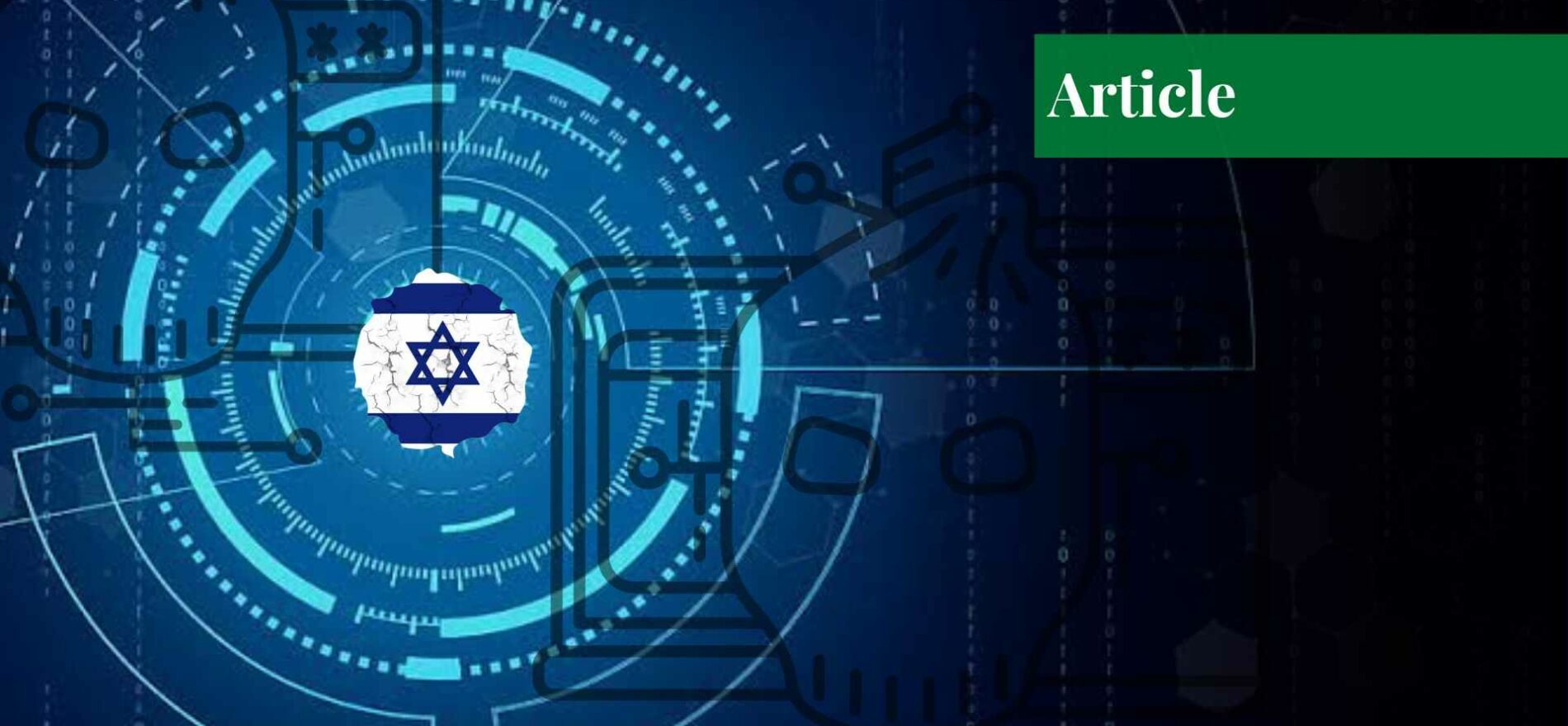Ms Fatimah Naeem is pursuing her Bachelor's in Peace and Conflict Studies from National Defence University Islamabad.
Introduction
With technological advancements growing at an unprecedented rate, numerous states in the contemporary world are seeking the best opportunities in cyberspace. A rather small state in the Middle East, Israel’s tech sector has developed tremendously over the years and now stands on the global stage as one of the top five countries in the world in terms of its cybersecurity powers in cyberspace.
Known as the “startup nation,” many private cybersecurity franchises have emerged from within Israel, ultimately giving it an edge over its neighboring countries. Being surrounded by nation-states that it deems detrimental threats, Israel’s deterrence and protection have now become dependent upon cyberspace.
Israel’s Progression
Initially, cyberspaces were used by the intelligence services of various states such as Russia, the United States of America, and the United Kingdom as tools of protection to secure sensitive federal information. However, over the years, it was deemed and understood that industrializing this phenomenon for its civil counterparts would prove much more beneficial. Israel was one of the first countries to take this initiative and establish a multi-million-dollar startup to amalgamate the general public into the sector.
Israel has attracted one-fifth of the global private cybersecurity investment since 2019. Israel’s technology sector has been thriving, and the Israeli government doesn’t let the opportunity to boast about it escape. With a rapidly growing cybersecurity industry, Advanced Technologies Park—home to one of the biggest Israeli cyber franchises—commenced a unique scheme of exchange between private and public interests. It revolved around the Israeli cybersecurity philosophy, providing a theoretical as well as a practical framework.
Youth Recruitment
A country’s youth is considered to be the backbone of its future affairs. Recognizing this fact, the Israeli government invested extensively in its human capital and even started cyber education in its various educational institutes. Technologically empowering the youth and their academic pursuits has sown the seeds for Israel’s future endeavors in cyberspace. Individuals with higher cognitive functioning are exposed to more challenging aspects of cyberspace and are then recruited for military endorsement.
Upon completion of their military service, these individuals are merged within the different state-run infrastructures and are instructed to look for gaps to inculcate cybersecurity. This is indeed a unique perspective of protection against invasive and threatening attacks from neighboring countries while also providing better opportunities to the youth in the long run.
The Infamous Unit 8200
Israel is living under the constant worry of being surrounded by neighbors that the Israeli government classifies as “enemy” states. Understanding the need of the hour, massive amounts of investment in world-class hacking and AI as instruments to compete in warfare were encouraged. This also assisted in moving the older warfare mechanisms from traditional battlefields to cyberspace. This newly emerging theater of operations required tools for initiating defensive as well as offensive strategies.
Unit 8200 is one of Israel’s best intelligence and technology units. It is considered to be a cluster of huge amounts of information contained within a singular enterprise. The workforce consists of both enlisted and career individuals, with veterans working within Israel’s infrastructure development. Individuals associated with Unit 8200 have casually dropped its name in conversations or statements regarding cyber defense and cyber offense. The whereabouts and activities of this particular unit have been kept confidential, but its involvement in the Stuxnet incident has been widely speculated.
Stuxnet is a hostile computer worm that had infiltrated and caused substantial damage to Iran’s nuclear program. It was determined by numerous analysts that the virus was deliberately programmed to attack the centrifuges in the Iranian nuclear plant. Even though the malicious computer worm has been associated with the cyber weapons of the US and Israel, both countries have denied involvement so far.
Similarly, the Pegasus spyware was one of Israel’s cyber inventions, developed, marketed, and licensed by the Israeli NSO Group. It has the capability of hacking into phones and turning them into 24-hour surveillance devices.
Key Factors of Israel’s Dominance
The contemporary world has adopted multi-polarity with the continuous advent of technology. Many powerful states such as the US, Russia, China, India, the UK, and the Korean Peninsula have funded massive amounts of the state budget into cyber warfare. In the race to compete with and attack neighboring countries or other powerful countries, many states completely ignore the aspect of their own security being breached.
Israel, playing its part with rather cunningness, has been focused on developing its defensive strategies and identification of malicious computer viruses. There is an extremely thin line between cyber offense and defense, but the Israeli government has been able to navigate through it quite impressively.
As other states focus on infiltrating each other’s systems, Israel has taken to its cyber security development, ultimately granting it a boost against dangerous breaches that compromise state confidentiality. This has also been beneficial in helping Israel’s intelligence and military develop offensive cyber tools against different security measures taken by other states as well.
Surveillance of the Palestinian Territories
The Israeli Defence Force (IDF) and the Palestinian Hamas have consistently bombed each other’s territories since the independence of Israel in 1948. With populations on both sides threatening one another, Israel decided to take a step further and implant cyber surveillance throughout the Palestinian territory. Whether they are a threat or not, every Palestinian is kept under constant observation. Concealed in the disguise of cybersecurity, the Israeli military and government have initiated hacking as well.
Eavesdropping on personal conversations of Palestinian individuals and using the collected information as a means to facilitate themselves, the Israeli cyber units have expanded their intelligence network considerably over the years. By constantly depriving the Palestinian populace of stable Internet connections, the Israeli government and military have established an impressive defense mechanism against neighboring threats. This mechanism of utilizing cyberspace has invited investments worth millions into the small state.
Infrastructural Control
Israel, comprising an approximate population of 9 million, does not have enough manpower or labor resources to carry out the country’s infrastructural functioning. This has ultimately led the government to seek cyber control in those departments. Farming, sanitation, construction, and many other aspects are being carried out under the continuously prospering tech industry of Israel.
With the mobility of control, some risks are also associated. In 2015, Ukraine experienced a power grid shutdown where its industrial control systems were simultaneously hacked. It evoked the dangers of cyber weapons, such as hacking, and how easy it is to be hacked. Another incident of that exact nature took place in Germany where steel mills were blown up using a cyberattack in 2014. This dramatic transition of offensive strategies from mere data and privacy invasions to safety and life-threatening prospects has significantly changed the course of cyberwarfare and cyberweapons.
Conclusion
The concept of cyberspace is indeed a new one, and its demand is rising day by day. Israel has rolled the dice in its favor and has been able to reach the top of the cyber game. With easier access to the internet nowadays, many individuals, groups, and nations stand vulnerable to cyberattacks, but Israel, being one of the biggest cyber powers in the world, has steered clear of endangerments by technologically empowering its human capital. As the need for cyber security companies increases day by day, the crippling potential of cyberwarfare only continues to grow as well.
If you want to submit your articles, research papers, and book reviews, please check the Submissions page.
The views and opinions expressed in this article/paper are the author’s own and do not necessarily reflect the editorial position of Paradigm Shift.



















